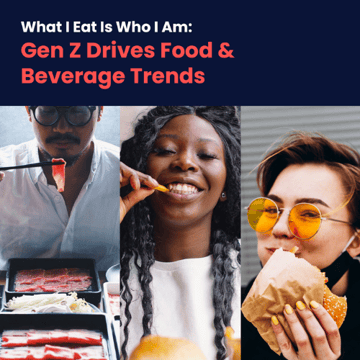What I Eat Is Who I Am: Gen Z Drives Food & Beverage Trends

Generation Z has unprecedented consumer influence in the food and beverage industry, driving change that impacts meals for all generations. We experience this every day at Sodexo as we engage with Gen Z college-aged students on the campuses we serve.
Who is Gen Z? Currently ages 12 to 25, the youngest members of Gen Z were born in 2011 – before the 2010 launch of the iPad defined the beginning of the Gen Alpha generation. In contrast to the Millennial generation before them, Gen Z feels unsettled in a threatening world and are unwilling to play it safe as they usher in an era where online relationships are as rich as those IRL (in real life). They are the most ethnically diverse generation the U.S. has seen and are diverse in other ways as well. A full 34% of Gen Zs identify as LGBTQ+ (compared to 14% of Millennials).
We partnered with Cassandra, the foremost authority on Gen Z and Gen Alpha research and emerging trends, to uncover young people’s shifting mindset around food and beverage. These insights are the foundation of the offers and services we provide on campus, helping us stay a step ahead of student desires to deliver the timely innovation they crave.
Gen Z Puts Their Money Where Their Mouth Is – Literally
 Food is central to the identity of Gen Z – to say that food matters for young consumers is an understatement. Topped only by music and gaming, food is one of the top three attributes that make up Gen Z identity. In addition, food is central to self, no longer seen as just daily fuel but also as part of an individual’s multifaceted personality.
Food is central to the identity of Gen Z – to say that food matters for young consumers is an understatement. Topped only by music and gaming, food is one of the top three attributes that make up Gen Z identity. In addition, food is central to self, no longer seen as just daily fuel but also as part of an individual’s multifaceted personality.
Gen Z spend most of their disposable income dining out, making it the biggest spending category for today’s youth. At 40%, dining out tops big Gen Z spending categories like fashion at 35% or outdoor activities at 18%. For 4 in every 5 Gen Z, food and drink purchases are more than just sustenance – dining is also an opportunity to explore and connect with cultures from around the world.
While TikTok is the main source of Gen Z meal inspiration at 53%, rising categories include entertainment at 32% and gaming at 16%. Technology plays a large role in Gen Z eating habits, especially as Gen Z continues to seek food that connects online moments and real-life events.
This blend of online and real-life experiences is fueling the success of virtual dining concepts with content creators like MrBeast.Exclusively available through online orders, MrBeast Burgers and other virtual dining concepts deliver a high street-retail experience with the power of online influencers. The online-only ordering method shows an evolution of traditional campus life to meet students where they are today – be it virtual or physical.
There is one physical obsession that 5 in 7 Gen Z are consuming throughout the entire day – water. This passion goes beyond hydration to also build identity, as viral TikTok filters categorize users based on their water brand “personality.” While spending on soft drinks in the U.S. continues a decades long decline, healthy and hydration-focused drinks continue to engage this age group.
As Gen Z moves beyond food’s impact on physical health, young consumers are increasingly looking for their diet to also strengthen and improve their mental health. Almost half of Gen Z anticipate an emphasis on consuming foods and beverages that benefit their mental health.
The Evolving Food Ethics
 Food morality, as in “good” vs. “bad” food, has often been discussed within the scope of a calorie amount. For Gen Z, defining food morality by carbon score is just as important. 1 in 4 Gen Z indicate “zero carbon footprint” meals are the trend to keep an eye on as the food industry approaches a climate crisis reckoning.
Food morality, as in “good” vs. “bad” food, has often been discussed within the scope of a calorie amount. For Gen Z, defining food morality by carbon score is just as important. 1 in 4 Gen Z indicate “zero carbon footprint” meals are the trend to keep an eye on as the food industry approaches a climate crisis reckoning.
Change-making Gen Z ranks the food industry as #3 on the list of biggest environmental offenders. Falling behind fossil fuel at #1 and the car industry at #2, Cassandra’s research indicates that food will only rise as a climate offender unless the industry delivers fast innovation similar to the rapid pivot to electric cars. Gen Z will drive climate-conscious food and beverage behaviors as food becomes a pivotal tool to mitigate the climate crisis. We see this on campus as Gen Z students continue to drive our shift towards plant-based menus and food waste reduction.
Today, Gen Z prioritizes “taste” and “nutrition” in their food choices with an eye on “cost.” Cassandra predicts Gen Z will refocus their priorities on nutrition, environmental impact, and the food experience as youth explore cultural variety through cuisine.
The pandemic placed a spotlight on sanitation and worker conditions and Cassandra predicts this focus is here to stay. These factors will likely continue to impact Gen Z consumption habits for the foreseeable future, as the lens through which they see the world is colored with a deep awareness and desire for change.
As Gen Z continues to impact consumer behavior around the world, keeping a pulse on the food and beverage trends of this generation is one of our key responsibilities as a campus partner impacting the everyday life of those we serve.
Download a pdf version of this blog
If you would like to learn about more research and data trends as they relate to Gen Z, download our 2022-23 Student Lifestyle Survey report.
This analysis was provided in collaboration with Sodexo’s partners at Cassandra.